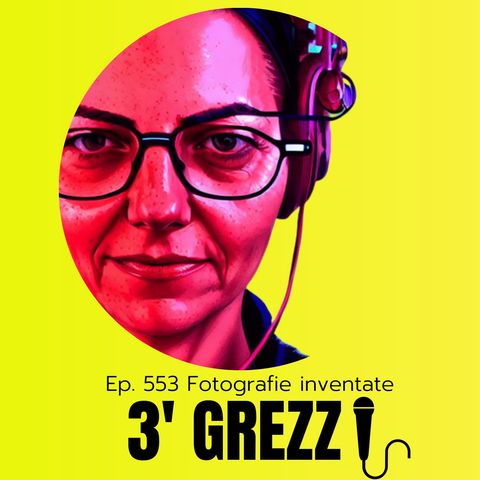3' grezzi Ep. 553 Fotografie inventate

Scarica e ascolta ovunque
Scarica i tuoi episodi preferiti e goditi l'ascolto, ovunque tu sia! Iscriviti o accedi ora per ascoltare offline.
3' grezzi Ep. 553 Fotografie inventate
Descrizione
Ormai le fotografie non servono più a fissare un momento nel passato, sono diventate un modo per presentare la migliore versione di noi nel presente. Teniamolo presente. TRASCRIZIONE [ENG translation...
mostra di piùTRASCRIZIONE [ENG translation below]
Oggi, grazie a tutti gli strumenti che abbiamo a portata di dito per modificare le fotografie, quando facciamo una fotografia sempre meno rappresentiamo la realtà che ci circonda, ma sempre di più stiamo manipolando la realtà per farla stare nell'idea che noi abbiamo del momento.
Quindi se facciamo una fotografia in un momento che siamo molto felici, allora sicuramente vogliamo rendere il cielo più soleggiato, l'azzurro più drammatico, vogliamo l'acqua ancora più trasparente e, con strumenti che sono alla portata di tutti, molti sono gratuiti, possiamo anche eliminare le persone che non ci piacciono dalla spiaggia, possiamo eliminarle tutte, così che diamo l'impressione di essere su una spiaggia, le uniche persone quindi, anziché essere sulla spiaggia affollata con tutti gli altri bagnanti.
Perché sto parlando di manipolazione della fotografia? Le fotografie da sempre sono state una manipolazione della realtà, anche prima dell'esistenza degli strumenti digitali, perché il fatto stesso che si puntasse l'obiettivo della macchina fotografica su una determinata porzione escludeva automaticamente tutto quello che c'era intorno. Quindi l'inquadratura, dall'alto, dal basso, dava comunque una nostra interpretazione.
Però era un'interpretazione limitata, oggi possiamo fare molto di più con gli strumenti che abbiamo a disposizione in tutti i cellulari praticamente, come ho detto, molti sono anche gratuiti.
La cosa che stiamo facendo, di cui non ci rendiamo conto, però, è che stiamo manipolando anche quello che noi lasceremo alle generazioni future. Perché se io vado a casa di mia mamma e prendo la scatola di latta dove ci sono le fotografie, quelle danno, a parte il fatto che sono fotografie cartacee e quindi sono ingiallite, sono invecchiate, si vede che sono fotografie vecchie, hanno un colore diverso, quindi si portano dietro tutto un loro vissuto. E sono le stesse fotografie che prendevo in mano quando ero bambina, anche se allora mi sembravano meno vecchie.
Ora, con le immagini digitali questo non è più possibile. Prima di tutto perché non abbiamo in mano un bel niente, ma sono sempre come se le avessimo appena appena scattate, appena create. E poi stiamo trasferendo a quelli che vengono dopo di noi una realtà che ci siamo immaginati perché sempre di più le fotografie vengono usate non tanto per rappresentare il passato, rappresentare qualcosa che è successo, ma sempre di più per presentare la migliore versione di noi stessi e di noi stesse, così come vogliamo che gli altri ci vedano.
Quindi una realtà sempre più mediata, una realtà sempre più vicina ai ricordi. E si sa, i ricordi sono sempre molto soggettivi, non sono mai una cosa oggettiva. Basta che ci riflettiamo.
TRANSLATION
Today, thanks to all the tools we have at our fingertips to edit photographs, when we take a photo, we represent reality less and less surrounding us, but we manipulate reality more and more to fit our idea of the moment. So, if we take a photo when we're very happy, then we definitely want to make the sky sunnier, the blue more dramatic, and we want the water even more transparent with tools that are available to everyone, many of which are free, we can even remove people we don't like from the beach, we can remove them all, so that we give the impression of being on a beach, the only people there, instead of being on a crowded beach with all the other swimmers. Why am I talking about manipulating photographs?
Photographs have always been a manipulation of reality, even before the existence of digital tools because the mere fact of focusing the camera lens on a specific portion excluded automatically everything that was around. So framing, from above, from below, still gave our interpretation.
But it was a limited interpretation, today we can do much more with the tools available on practically every mobile phone, as I said, many are also free. What we are doing, though, without realizing it, is manipulating what we will leave to future generations. Because if I go to my mom's house and take the tin box where the photographs are, those, apart from the fact that they are paper photos and therefore they are yellowed, aged, you can tell they are old photos, they have a different color, so they carry their own history.
And they are the same photos I used to hold as a child, even though they seemed less old to me back then. Now, with digital images, this is no longer possible. First of all, because we don't have anything in our hands, but they always seem as if we just took them, just created them.
And we are transferring to those who come after us a reality that we have imagined because increasingly photographs are used not so much to represent the past, to represent something that happened, but more and more to present the best version of ourselves, as we want others to see us. So a reality that is increasingly mediated, a reality that is increasingly close to memories.
And as we know, memories are always very subjective, they are never objective. Just think about it.
Informazioni
| Autore | M. Cristina Marras |
| Organizzazione | M. Cristina Marras |
| Sito | - |
| Tag |
Copyright 2024 - Spreaker Inc. an iHeartMedia Company

Commenti